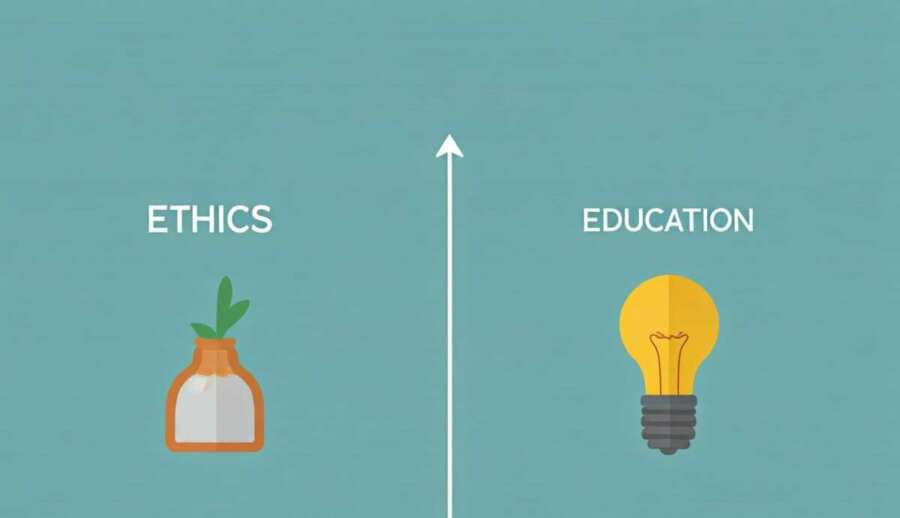Ethics discusses what moral virtues and vices are (peaks) and the hierarchy of these virtues and vices and moral concepts and the relationship between these concepts, while education (about moral education) discusses how to reach the peaks of values (path). The foundations of jurisprudence of ethics and jurisprudence of education, such as anthropology and ontology, should be examined in other sciences and accepted as principles of confirmation in jurisprudence of ethics and jurisprudence of education.
Although the science of ethics and the science of education have a long history as two ancient sciences in the humanities, the addition of the suffix “jurisprudence” to these two has brought many challenges. One of the most important of these challenges is the difference between the science of ethics and the jurisprudence of ethics, and the science of education and the jurisprudence of education. Hujjat al-lslam Reza Hajipur, who, in addition to years of attending courses outside of jurisprudence and principles, has also obtained a Level 3 degree in ethics and a PhD in ethics from Tarbiyat Mudarres University, attempts in this special note to address the difference between ethics and education as a knowledge in the humanities and the jurisprudence of ethics and the jurisprudence of education as two branches of jurisprudence.
There are at least three types of encounters for the scientific understanding of phenomena, including ethics and education: religious (jurisprudential), rational (philosophical), and empirical (applied).
The jurisprudential encounter with the phenomenon of ethics and education can also be of two types:
1.Examining the religious ruling (obligation, prohibition, desirability, dislike, and permissibility) of virtues and vices, and moral and educational behaviors. This encounter can be interpreted as the jurisprudence of moral judgment and the jurisprudence of education.
2.The study of moral and educational issues as they are in these two sciences, with the same subjects and predicates, by the method of jurisprudential jurisprudence (the customary and rational method) and by using the sources of jurisprudential jurisprudence (the Book, the Sunnah, reason, rational conduct, religious conduct, etc.). This encounter can be interpreted as the jurisprudence of non-jurisprudential ethics and the jurisprudence of non-jurisprudential education, or the jurisprudence of the moral system and the jurisprudence of the educational system.
The difference between ethics and education and the jurisprudence of ethics and the jurisprudence of education.
There are at least three views on the difference between ethics and education and the jurisprudence of ethics and the jurisprudence of education:
1.Ethics discusses what moral virtues and vices are (peaks) and the hierarchy of these virtues and vices and moral concepts and the relationship between these concepts, while education (in the case of moral education) discusses how to reach the peaks of values (the path). The foundations of moral jurisprudence and educational jurisprudence, such as anthropology and ontology, should be examined in other sciences and accepted as principles of confirmation in moral jurisprudence and educational jurisprudence. (Alamzadeh Nuri, Introduction to Moral Jurisprudence, pp. 215-217)
2. Morals discuss self-development and education discuss other-development (A’rafi, Educational Jurisprudence, vol. 1)
3.Education discusses the fundamental development of man and ethics discusses the development in different dimensions of man (Hadi Zadeh)
In this way, the points of difference and commonality between moral jurisprudence and educational jurisprudence will be different depending on the different definitions of morality and education and the jurisprudence of morality and educational jurisprudence.
It seems that the first definition of the jurisprudence of ethics and the jurisprudence of education is more defensible than the other two definitions, with four explanations:
First, if the foundations and goals of any educational field are not discussed at all or sufficiently in another science, the jurist of education is forced to discuss it in the jurisprudence of education.
Second, we should consider the jurisprudence of moral ethics and the jurisprudence of education to be included in the terms jurisprudence of ethics and jurisprudence of education; because the practice of ethics and education, and consequently the knowledge of ethics and education, is not without the need for knowledge of the religious ruling on the properties, states, and behaviors of ethics and education.
Third, the jurisprudence of ethics should be considered to include all areas of ethics, including normative ethics, descriptive ethics, applied ethics, and metaethics (cf. Ghanavi, Introduction to the Jurisprudence of Ethics). The jurisprudence of education should also be considered to include all areas of man, including the intellectual and scientific aspects, the spiritual aspects, the doctrinal and devotional aspects, the emotional aspects, the social aspects, and the physical aspects.
And fourth, the unity of method and source in jurisprudential and non-jurisprudential jurisprudence does not mean unity in details, but rather unity in the principle of being customary and rational. The details of the methods and the way to arrive at the Islamic view in jurisprudence may differ greatly from what is in jurisprudential jurisprudence.

